You are using an out of date browser. It may not display this or other websites correctly.
You should upgrade or use an alternative browser.
You should upgrade or use an alternative browser.
“Black Men Who Have Some Weird Fascination With Martial Arts Are Truly A Joke” - Mexican Coli member
- Thread starter KyokushinKarateMan
- Start date
More options
Who Replied?KyokushinKarateMan
Train hard, fight easy
/thread
That’s that Kyokushin blood. Osu!
The Kyokushin Karate Roots of Michael Jai White

Victory Dojo & Fitness chief instructor Brian Bastien looks on as kyokushin karate black belt and film/TV actor Michael Jai White talks to the young students in attendance.
Kyokushin karate — the fighting art founded by Mas Oyama, a man who battled live bulls, occasionally lopping off their horns with his knifehand strike — has a reputation for toughness, including full-contact sparring with minimal safety gear.
But that never scared off Michael Jai White, a lifelong martial artist and actor who’s part of the Victory Dojo & Fitness family. In fact, Michael Jai White has always enjoyed the physicality and discipline of the art, calling it his “savior.”
“I had a lot of angst growing up, and martial arts just felt natural to me,” said Michael Jai White, who holds black belts in seven styles. “I enjoyed fighting when I was a kid. I used every excuse I could to fight.” He began studying shotokan karate at age 7, then switched to kyokushin under Shigeru Oyama.
The latter was the art in which he received his first black belt while still a teenager. He hopes Victory Dojo — located in Burbank, California — will do for today’s youth what his kyokushin dojo did for him. To that end, when he’s in town during breaks from his busy schedule, he’s helping mold it into a school that emphasizes character development as well as physical skills.
And this month, Victory Dojo celebrates the 50th anniversary of its headquarters’ founding.
VICTORY DOJO: THE KYOKUSHIN KARATE HOME OF
MICHAEL JAI WHITE
Michael Jai White Takes You Inside the Kyokushin Karate School He Calls Home When He’s Not Working in Film and TV
“Our school is very basic and very traditional — the way we train is the way they’ve trained in Japan for the past 50 years,” said Michael Jai White, who joined the venture as a “spiritual partner” with his teacher, Brian Bastien.
The headquarters dojo was founded in 1964, according to Robert Christophe, head instructor at Victory Dojo. Brian Bastien opened his Victory Dojo branch at the Burbank YMCA, but he was forced to move because the staff wanted to eliminate sparring from his classes. “We’re a fighting style,” Brian Bastien said, “so without fighting, it’s just like dancing.”
When Michael Jai White isn’t acting, directing or writing screenplays, he’s at the school teaching clinics in techniques and weapons. His message is simple: The discipline required to succeed in the martial arts transfers directly to the world outside the dojo.
“Discipline has helped me in all facets of my life,” he said. “You can pretty much do anything if you have discipline. When you push yourself, you realize you can accomplish anything you set your mind to.”
After hopping from career to career, what Michael Jai White set his mind to was acting. He worked with Jean-Claude Van Damme on Universal Soldier in 1992, then starred in Tyson, Spawn, Black Dynamite and both Why Did I Get Married? movies. Among the newest notches on his belt are an appearance in The Dark Knight and the role of leading man anddirector for Never Back Down 2: The Beatdown.
But like a true karate master, Michael Jai White downplays his fame.
“I’m not a celebrity in my school,” Michael Jai White said. “That quickly goes out the window when you’re sweating together. It’s more about the fact that I’m a 230-pound guy who hits hard. I think that supersedes celebrity.”
White obviously takes his martial arts seriously, which is precisely what he conveys to his students. “If you’re trying your best, if you’re pushing yourself, I don’t care if you’re athletically gifted or not — it’s the effort you put out,” he said. “As long as you do that, I have respect for you.”

KyokushinKarateMan
Train hard, fight easy
Except there are African martial arts too but Ill let you cook.
Where are those mexican martial arts tho?
Martial arts doesn't just pertain to Asian combat styles
Martial Arts is rooted in Africa before anywhere else. Google it. Read it. Research.
F*ck anyones opinion.
I have an entire catalog/thread on the origins of martial arts- Afrikan Martial Arts- in The Root forum. It is unfinished at the moment, but still deep with info, nonetheless.
Let's Explore The Wide World of Black Martial Arts Disciplines
But racist Mexican trolls and c00ns alike continually equate any semblance of martial arts, with “Asia”, while abhoring any type of Black martial arts involvement.
Just one of many displays of racial ignorance from non-Blacks.
The Fade
I don’t argue with niqqas on the Internet anymore
That's spanish, not mexican. Mexican is not a language.
West coast gangsters copying mexican gangsters lol, you are watching too much Colors.
He woulda been more right if he said ITALIANS, cause nikkas stay calling themself Montana, wearing Italian shyt and being aligned with mobster bosses.
BUT, Italians stole a lot of those schemes from Black Chicago Mobsters. Especially the dude who Quincy Jones said took out Kennedy
Only nikka who makes Chapo references is Gucci really and sometimes nikkas say La Coca

Formerly Black Trash
Philosopher, Connoisseur, Future Legend
@CarbonBraddock you gonna take that Black BJJ practitioner slander?
KyokushinKarateMan
Train hard, fight easy
Chaka Zulu
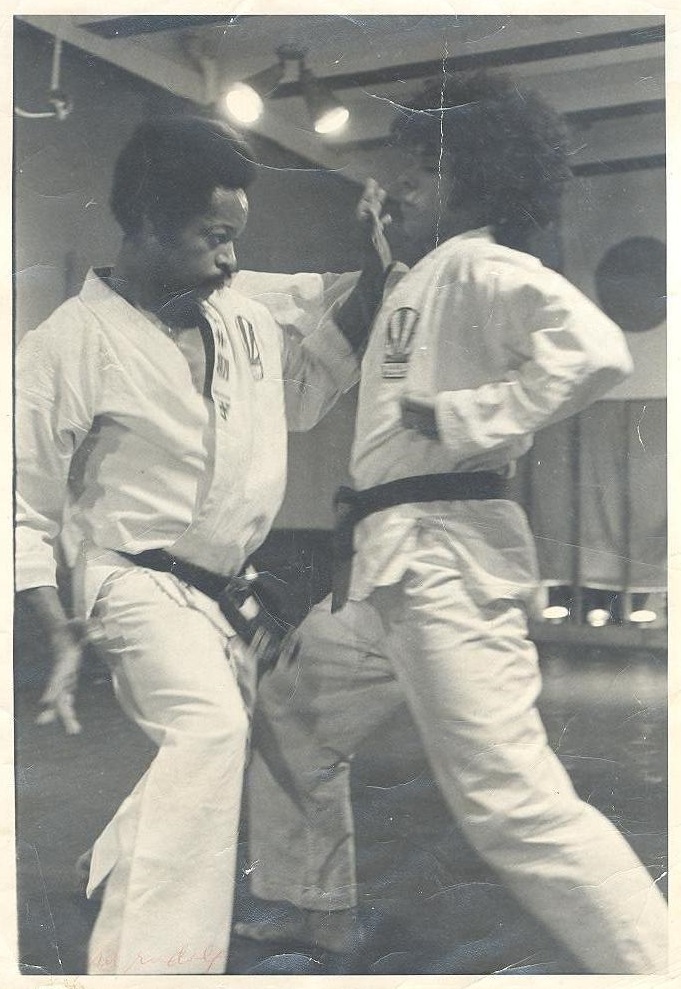
No disrespect, but much of what I hear about this master is more Sho’nuff that Bruce Leroy. Not saying that he was a bad man, but he was a teacher who was not to be trifled with, physically punishing students if they entered the dojo overweight or unkept.
According to his website he holds black belts or equivalents in the following: Tae Kwon Do, Judo, Sanuces Ju-jitsu, and Nisei Goju Karate. In 1984, he founded Zujitsu Ryu: The Art of Zulu.
You can learn more about him here: www.zujitsu.com/zuluBio.html
…but beware of the red glow.

No disrespect, but much of what I hear about this master is more Sho’nuff that Bruce Leroy. Not saying that he was a bad man, but he was a teacher who was not to be trifled with, physically punishing students if they entered the dojo overweight or unkept.
According to his website he holds black belts or equivalents in the following: Tae Kwon Do, Judo, Sanuces Ju-jitsu, and Nisei Goju Karate. In 1984, he founded Zujitsu Ryu: The Art of Zulu.
You can learn more about him here: www.zujitsu.com/zuluBio.html
…but beware of the red glow.
Pit Bull
GATOR
Fixed, Let's start being more specificSo does the fact that his worthless people have the same "weird fascination" with hip hop, calling themselves "nikkas", and everything else related to Black culture make them "jokes" as well?
We set trends. They follow us. We dominate pop culture. Ain't nobody copying no swagless, corny Mexicans. But the Black American man, on the other hand, is the most emulated and copied race on this planet. And that's what really eating these white supremacist mascots up from the inside out

KyokushinKarateMan
Train hard, fight easy
Fred Hamilton

Uptown baby, the Harlem World martial artist (per USADJO.com) was instrumental in pioneering bare knuckle full contact karate. In addition, he was the first martial artist to allow women to participate in martial arts competition. Editorial changes at Black Belt magazine during the mid 70s provided acknowledgement of Hamilton in the the June, 1975 article THE GREAT BLACK HOPE.

The Great Black Hope – Black Belt Magazine June 1975
The article focused on his effective teaching style, using martial arts to save youths in a community infested with Nicky Barnes’ poison. You can learn more about him by contacting his student and friend Raymond McRinna: www.facebook.com/raymond.mcrinna

Uptown baby, the Harlem World martial artist (per USADJO.com) was instrumental in pioneering bare knuckle full contact karate. In addition, he was the first martial artist to allow women to participate in martial arts competition. Editorial changes at Black Belt magazine during the mid 70s provided acknowledgement of Hamilton in the the June, 1975 article THE GREAT BLACK HOPE.

The Great Black Hope – Black Belt Magazine June 1975
The article focused on his effective teaching style, using martial arts to save youths in a community infested with Nicky Barnes’ poison. You can learn more about him by contacting his student and friend Raymond McRinna: www.facebook.com/raymond.mcrinna
KyokushinKarateMan
Train hard, fight easy
George Cofield
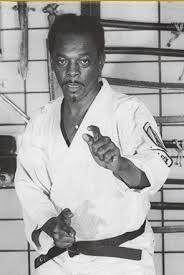
Master of Shotokan karate. The real life Sho’nuff, red glow originator and the man who founded the infamous Tong Dojo, located in Brooklyn. According to Black Martial Artists website, he received his initial training while in Japan, serving in the military and many of his students were successful champions and still continue his legacy today.
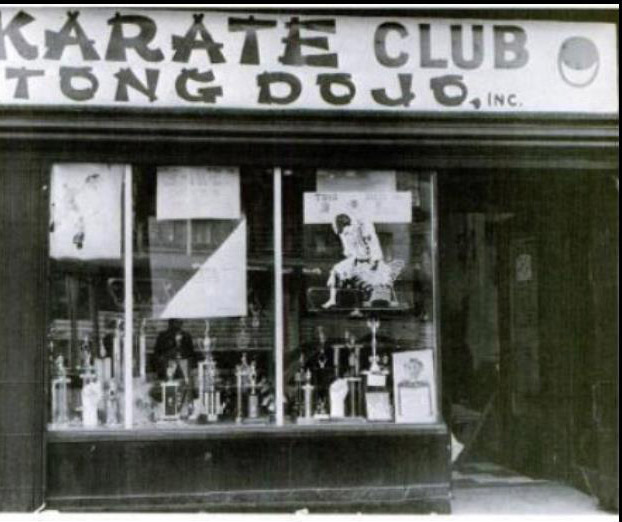
The Infamous Tong Dojo, Brooklyn, NY
Cofield was a bad-ass, one man who knew him, said that Samuel Jackson’s role in Pulp Fiction; Jackson was doing his best in that movie to emulate Cofield’s nature. When I get permission I’ll tell you about when he had Bruce Lee shook, all I can tell you now is “Brooklyn motherfukker!”
You can learn more about him by visiting: www.facebook.com/pages/My-Sensei-George-Cofield/167947099982198

Master of Shotokan karate. The real life Sho’nuff, red glow originator and the man who founded the infamous Tong Dojo, located in Brooklyn. According to Black Martial Artists website, he received his initial training while in Japan, serving in the military and many of his students were successful champions and still continue his legacy today.

The Infamous Tong Dojo, Brooklyn, NY
Cofield was a bad-ass, one man who knew him, said that Samuel Jackson’s role in Pulp Fiction; Jackson was doing his best in that movie to emulate Cofield’s nature. When I get permission I’ll tell you about when he had Bruce Lee shook, all I can tell you now is “Brooklyn motherfukker!”
You can learn more about him by visiting: www.facebook.com/pages/My-Sensei-George-Cofield/167947099982198
KyokushinKarateMan
Train hard, fight easy
Steve Muhammad
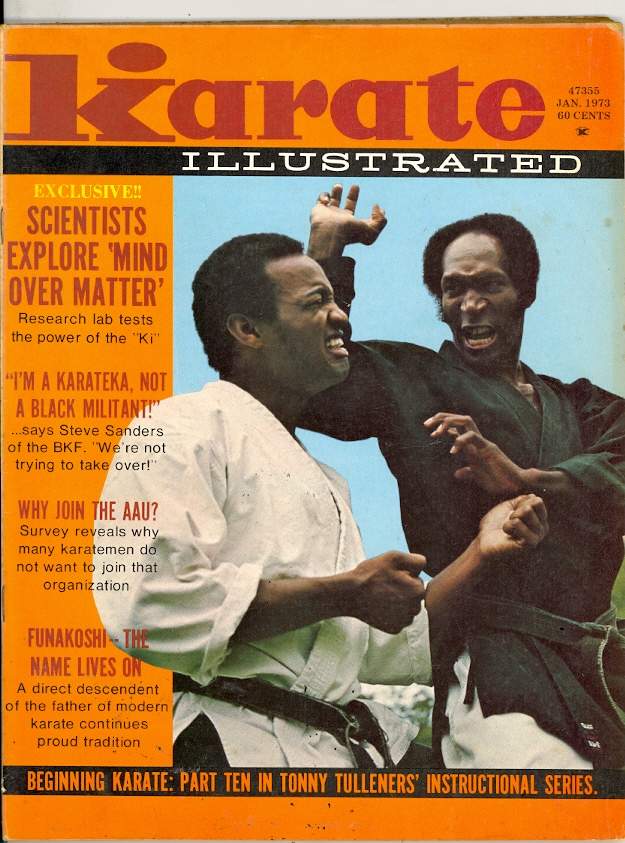
AKA Sijo Saabir Quwi Muhammad (born Steve Sanders). Founder of The Black Karate Foundation (BKF) and according to the BKF site, he won the Long Beach International Karate tournament nine times during the 1960s.
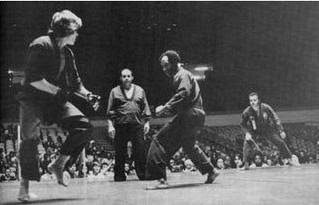
Steve Muhammad vs Joe Lewis
Despite successful play, there was overwhelming discrimination; he along with other brothers decided to form the BKF. He was inducted into the Black Belt Hall of Fame in 1982. He would later create a form of fighting known as The Invisible Fist. The grand master can be contacted here: www.facebook.com/steve.muhammad.9

AKA Sijo Saabir Quwi Muhammad (born Steve Sanders). Founder of The Black Karate Foundation (BKF) and according to the BKF site, he won the Long Beach International Karate tournament nine times during the 1960s.

Steve Muhammad vs Joe Lewis
Despite successful play, there was overwhelming discrimination; he along with other brothers decided to form the BKF. He was inducted into the Black Belt Hall of Fame in 1982. He would later create a form of fighting known as The Invisible Fist. The grand master can be contacted here: www.facebook.com/steve.muhammad.9
MewTwo
Freeing Pokemon From Their Masters Since 1996
Racism in the martial arts? It's one of the many areas where white people don't dominate.
Crimson_Dynamo
All Star
Only an ignorant idiot thinks Asians invented fighting anything. Their martial arts come from Greece by way of india. Japans home grown art are the styles of jujitsu . Meanwhile every other nation and race have home grown martial arts. Martial meaning military. If your people didn't have a martial art that means u didn't have a fighting force training to protect your land.
So do someone to say martial arts is weeaboo shyt is ignorant and uncultured. Keep doing u op. From a fellow martial artist.
So do someone to say martial arts is weeaboo shyt is ignorant and uncultured. Keep doing u op. From a fellow martial artist.
KyokushinKarateMan
Train hard, fight easy
Thomas La Puppet

The first Black martial artist to enter the Black Belt Hall of Fame. According to Black Martial Artistswebsite his successful tournament career in the late 1960s, included winning the All-American karate tournament on several occasions. A black belt in Karate, Jujitsu and Kenpo.
You can learn more about him here: www.blackmartialartist.com/TomLaPuppet.html
Sensei La Puppet Knife Attack Defense

The first Black martial artist to enter the Black Belt Hall of Fame. According to Black Martial Artistswebsite his successful tournament career in the late 1960s, included winning the All-American karate tournament on several occasions. A black belt in Karate, Jujitsu and Kenpo.
You can learn more about him here: www.blackmartialartist.com/TomLaPuppet.html
Sensei La Puppet Knife Attack Defense
DatLBCGuy562
Superstar
Who popularized low riders andWest Coast culture? It was NWA and Dr. Dre. Not no fukking Mexicans. Tattoos were found on ancient Egyptian mummies. That ordinates in AFRICA dummy. Learn your history. You're naming a couple of rappers, I'm talking about a WORLDWIDE influence. Who really copies Mexicans more than Black people? Go ahead Ese. Show me how fukking delusional and how much of a liar you are. Your people copy EVERYTHING my people do. From hip hop, to slang, to dress, cheering on and admiring our sports stars, etc. The Black man influences the WORLD. What current trends are Mexicans influencing? I'll wait. Don't name shyt from 30 years ago that Black people still popularized and took global, name some shyt RECENTLY. You're the only people that brag on being criminals and drug dealers. That's not something to be proud of JoseGet out of here u got rappers calling themselves migos, el chapo ect
So whose really copping who
And also west coast gangsters been on the mexican gangster look from lowriders to tattoos .

And lastly, if your culture is so great and Black people copy you, why are we having this discussion here, on a predominantly Black forum dedicated to discussing predominantly black issues and discussing predominantly black culture?

I heard brownpride.com is still accepting registrations

But you won't take your funky ass over there. Because that shyt is GARBAGE

You'll stay right here discussing Black issues, Black music, black culture, and Black historical figures because we're the flyest. And deep down, you jealous, corny, dikk riding, white ass kissing bytches know it

